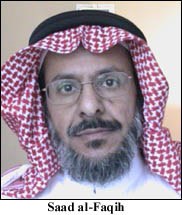 |
| Vol. 5 No. 11 | Table of Contents MEIB Main Page | November 2003 |
| | Interview: Dr. Saad al-Faqih Head of the Movement for Islamic Reform in Arabia (MIRA) |
 |
Saad al-Faqih was a professor of surgery at King Saud University until March 1994. He was jailed for his heavy involvement in the country's reform movement. Upon his release from prison, he became director of the London office of the Committee for the Defense of Legitimate Rights (CDLR), then the leading Saudi opposition group. He left CDLR to form MIRA in 1996. The interview was conducted by Mahan Abedin at Dr. Faqih's private residence in North-Central London.
Abedin is an analyst of Middle East politics, educated at the London School of Economics and Political Science.